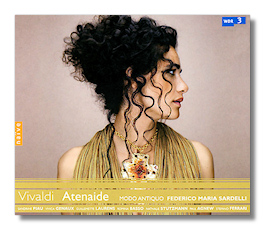
The Internet's Premier Classical Music Source
Related Links
- Vivaldi Reviews
- Latest Reviews
- More Reviews
-
By Composer
-
Collections
DVD & Blu-ray
Books
Concert Reviews
Articles/Interviews
Software
Audio
Search Amazon
Recommended Links
Site News
 CD Review
CD Review
Antonio Vivaldi

L'Atenaide, RV 702
- Sandrine Piau (Atenaide/Eudossa)
- Vivica Genaux (Teodosio)
- Guillemette Laurens (Pulcheria)
- Romina Basso (Varane)
- Nathalie Stutzman (Marziano)
- Paul Agnew (Leontino)
- Stefano Ferrari (Probo)
Modo Antiquo/Federico Maria Sardelli
Naïve OP30438 DDD 3CDs: 76:13, 75:27, 68:15
Naïve's gargantuan series of Vivaldi's music – specifically, scores and manuscripts housed in the National University Library of Turin – continues with another previously unrecorded opera. Atenaide was premièred in the Teatro della Pergola in Florence in 1728, when the composer was 50. Most of Vivaldi's operas were composed for Venice, but his relationship with that city's opera houses waxed and waned, and Atenaide was one of several operas commissioned from him by the Florentine impresario Marchese Luigi degli Albizzi. Vivaldi's relationship with Albizzi was a variable one too, however, and if Vivaldi had better resources on hand in Florence than in Venice, he also had less artistic freedom, and less leeway in engaging the singers he preferred. Indeed, the failure of Atenaide to enjoy great success during its original run has been blamed on the presence of Anna Girò in the role of Pulcheria. She was close to Vivaldi – perhaps even romantically involved with him – but contemporary accounts vary as to the excellence of her singing, and there might have been local bias against her.
When Atenaide was scheduled for revival in Florence a few years later, Vivaldi made changes to the score, adding and removing arias, probably to accommodate changes in the cast. What has been recorded here – authentically enough, in the Teatro della Pergola! – is the revised version of Atenaide, as the original version no longer exists. Both the original and revised versions contain arias that Vivaldi reused from older operas such as Farnace, Orlando furioso, and Dorilla in Tempe. Given the time and place, this was not unusual.
Apostolo Zeno's libretto is a mixture of romantic and political entanglements. The Christian Eudossa, also known as Atenaide, has come to Roman Byzantium from Athens with her father Leontino, and happily expects to wed the Emperor Teodosio. Varane, heir to the Persian throne, also desires Eudossa, and has followed her to Byzantium. Pulcheria, Teodosio's sister, is desired by Marziano, but Teodosio wishes her to marry Varane instead. Teodosio magnanimously allows Eudossa to choose between him and Varane. Her choice, symbolized by a ring, is connivingly given by Probo (an attendant who also desires Pulcheria) not to Teodosio but to Varane. Eudossa is surprised when she and her father are banished by Teodosio, and then she is kidnapped by Varane. Marziano, a general also in love with Pulcheria, returns in the nick of time to free Eudossa. Probo's subterfuge is uncovered, Marziano gets Pulcheria, Teodosio gets Eudossa, and Varane is forgiven (but apparently is still single).
The score is essentially a series of arias in ABA form separated by secco and accompanied recitatives which advance the plot. Performers of Vivaldi's time were expected to embellish their arias, particularly at the reprise of the "A" section, and that convention is stylishly followed in this recording. All of the characters have several arias. Although the singers are good vocal actors, the longer recitatives can try a listener's patience. For example, after the sinfonia, the opera opens with a seven-minute recitative for Eudossa and Leontino. Atenaide is no slower-going that the average Baroque opera, though, but it feels a little mellower than most – perhaps because there are no supernatural elements involved?
The cast is uniformly excellent, even in the punishing coloratura passages that Vivaldi apparently loved to write. There's a lot of lovely cantabile writing, however, and that plays to this cast's strengths. Piau is vulnerable yet palpably regal as the misunderstood Eudossa, and Genaux also projects royalty as Teodosio – without playing tricks with her voice, she projects a credible masculinity. Laurens and Basso make similar distinctions in their mezzo-soprano roles. Stutzmann brings fruity tone to the general Marziano, who saves the day at the opera's end. Agnew is a calm, concerned father-figure, and Ferrari an impressive hot-head in the role of the opera's true villain. Compared to the other conductors who have conducted operas in Naïve's Vivaldi series, Sardelli is relaxed. The score's lyrical elements are emphasized, not its blazing drama or virtuosity.
The big booklet contains the libretto and translations in several languages, plus an excellent introduction to the opera by Frédéric Delaméa, and artist biographies. The engineering is intimate, and yet it carries a sense of the Pergola's space.
Copyright © 2008 by Raymond Tuttle




















